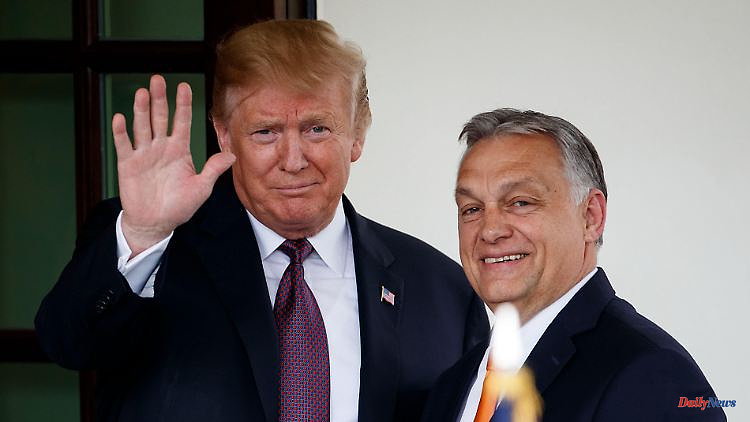Viktor Orban's visit to Berlin is accompanied by hymns of praise for ex-Chancellor Merkel. The Hungarian prime minister is certain that the war in Ukraine would not have happened with her. In his eyes, however, the best hope for a ceasefire is not with the incumbent US President.
Hungarian Prime Minister Viktor Orban waxes lyrical during his visit to Berlin as he discusses former Chancellor Angela Merkel and her role in the 2014 Ukraine conflict. "What Angela Merkel did during the Crimean crisis was a masterpiece," said Orban. There was no war at the time because the conflict had been isolated by Germany's diplomatic efforts. "They didn't let this blow up and we all got involved."
When asked whether, from his point of view, there would have been no Ukraine war if Merkel had remained chancellor, the Hungarian head of government answered in the affirmative. In the past, however, Orban has repeatedly criticized the chancellor. Now the right-wing ruler claims that Merkel prevented a war in 2014 through her actions after the Russian annexation of Crimea. On the other hand, when Russia attacked Ukraine in February, there was no one who even tried to prevent it.
Orban argued that negotiations on a ceasefire in Ukraine between the US and Russia must be decided. According to Putin's friend, Ukraine shouldn't even be sitting at the negotiating table. "Anyone who thinks that this war will be concluded through Russian-Ukrainian negotiations does not live in this world. The reality of power is different." Ukraine can only defend itself against the Russian invaders because it has military support from the United States. "That's why the Americans have to come to an agreement with the Russians. And then the war will be over."
For negotiations on a ceasefire, Orban is not counting on US President Joe Biden, but on Donald Trump, who was voted out two years ago. "What I'm saying will sound brutal now, but hope for peace is called Donald Trump," said Orban at an event organized by the magazine "Cicero" and the "Berliner Zeitung", according to the official translation. The current US President, on the other hand, is not suitable as a negotiator for talks with Putin because of his sharp verbal attacks ("war criminal", "butcher", "murderous dictator").
Either way: "The ceasefire does not have to come about between Russia and Ukraine, but between America and Russia," said Hungary's prime minister during his visit to Berlin. Orban has been heavily criticized in the EU for his closeness to Trump and Putin.
Orban met Merkel on Sunday during his several-day stay in Berlin before Chancellor Olaf Scholz. Nothing was initially known about the content of the conversation. Orban was then received by Scholz in the Chancellery on Monday. The Prime Minister then said: "I am pleased to be able to tell you that he (Scholz) is still alive. Me too, so the conversation was fruitful." The chancellery said nothing about the meeting, which Orban said lasted two hours. A joint press conference, which is customary at such meetings, was not even scheduled without justification.
The Hungarian head of government is seen by many in the EU as a right-wing troublemaker. He is repeatedly accused of violating the rule of law and is currently being criticized for alleged misuse of EU funds. Most recently, he drew attention to himself with his criticism of the EU sanctions against Russia. He reiterated this in Berlin: "The sanctions in this form are killing us," he said. They would also ruin the German economy: "What the (EU) Commission is doing now in terms of sanctions is catastrophic."
Orban believes that EU sanctions in their current form would harm the EU more than Russia. If they had been designed smarter, energy prices wouldn't be as high today. However: in the Council of EU states, which must take these decisions unanimously, Hungary always voted for the respective sanctions packages. "When it comes to energy, we are dwarfs and the Russians are giants. A dwarf sanctions a giant. And then we are amazed that the dwarf dies," he said in Berlin.












